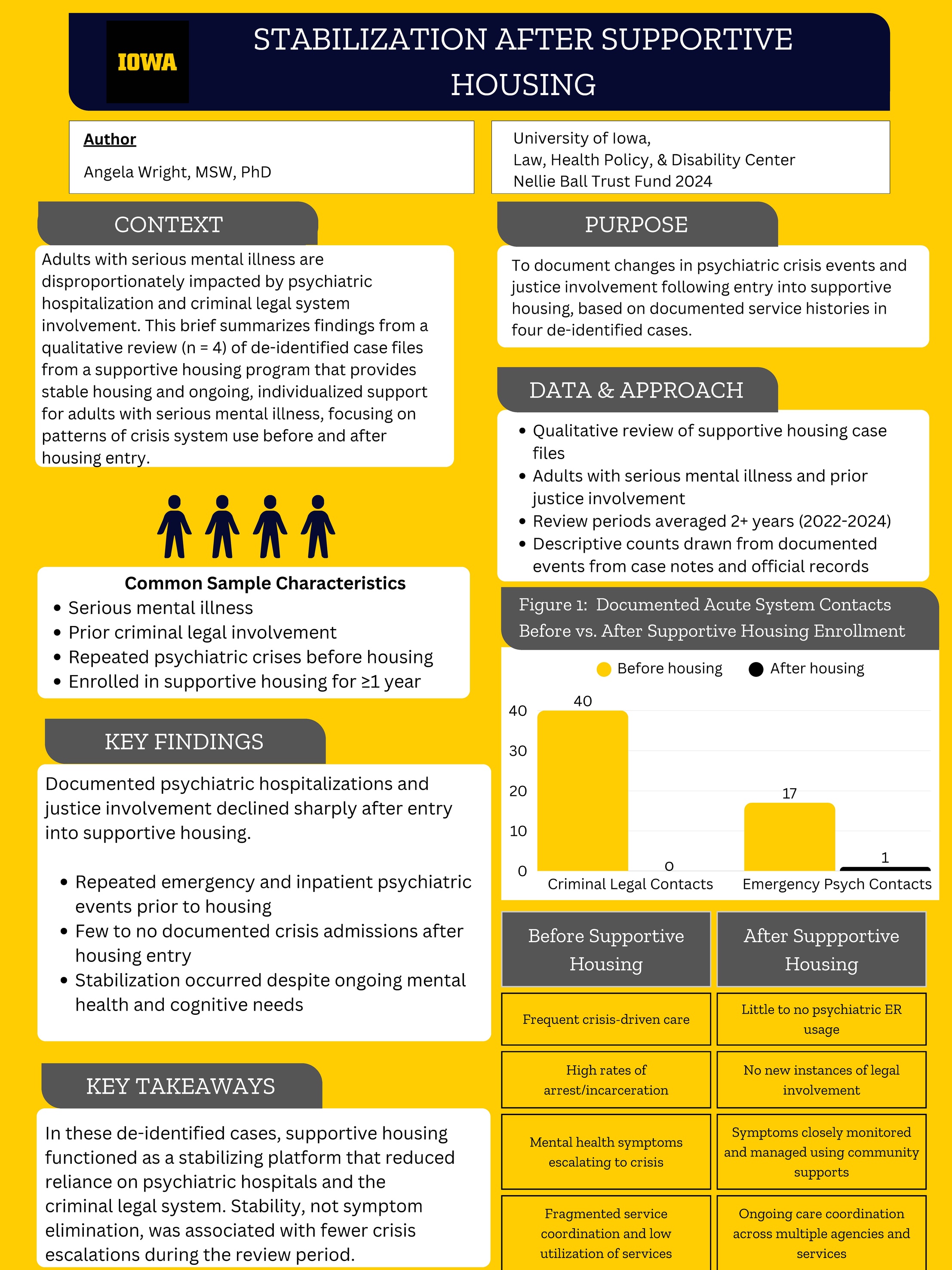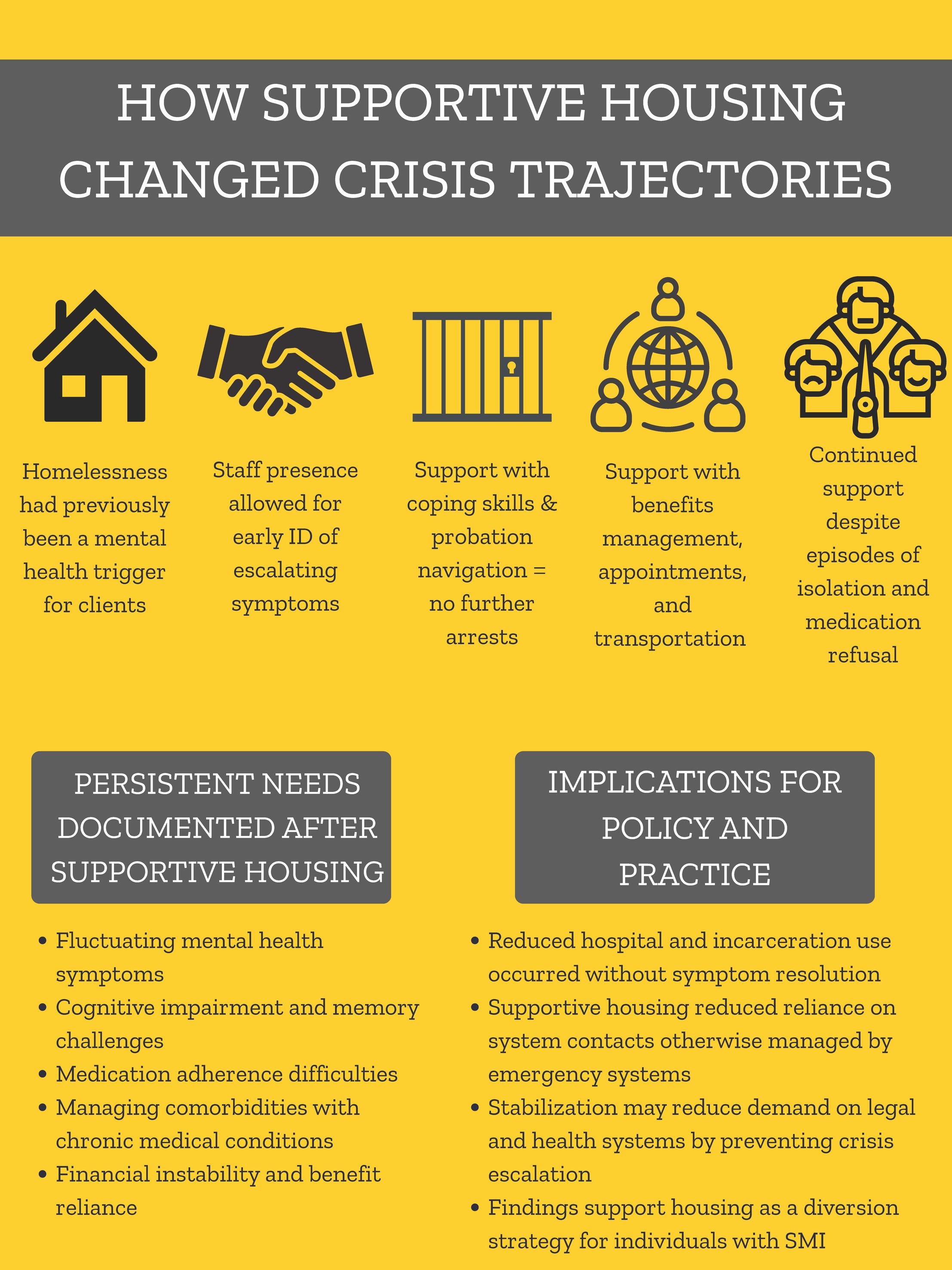Research Services at the LHPDC Overview Presentation
Polk County Mental Health and Disability Services Regional Evaluation
The Polk County Region oversees the following service delivery programs available to people with disabilities in Polk county: Community Employment, Integrated Services, Integrated Health Homes, Service Coordination, and Community Living. LHPDC acts as an independent evaluator for these services, providing an annual evaluation for each program. LHPDC uses participant interviews, interviews/focus groups, and agency-provided data to evaluation services based on specific outcomes. The outcomes include Participant Satisfaction, Participant Quality of Life, Family and Concerned Other Satisfaction, Participant Empowerment, Community Inclusion, Employment for Self-Sufficiency, Engagement in Employment, Education, Access to Somatic Care, Involvement in the Criminal Justice System, Emergency Room Visits, Psychiatric Hospitalizations, Community Housing, Homelessness, Negative Disenrollments, Positive Disenrollments, Staff Stability, and File Reviews.
Projects Funded by Nellie Ball Research Trust Fund
Jail Diversion Program in Polk County
The Jail Diversion Program has been in place in Polk County Jail for over a decade with the goal of helping the jail's population with serious mental illness to return to the community safely and to reduce the chances they will reoffend in the future. However, the county has not fully explored the data they have collected over the years to understand the factors that relate to the program's effectiveness or the challenges that might limit the program's effectiveness. The purpose of this research is to use data that are currently available to investigate the factors that lead to desired outcomes or create challenges to the success of the program. This project was funded by the Nellie Ball Trust Research Fund. See News Release coverage here
This research was presented by Heeren at the National Health Care Systems Research Network Conference in Pasadena. See full presentation here
Mapping Policy Impacts
Systemic shortcomings in housing, healthcare, and social policy create conditions of scarcity, isolation, and criminalization for individuals with Serious Mental Illness (SMI). These conditions are exacerbated by discriminatory housing policies, underfunded healthcare systems, and criminal justice practices that disproportionately penalize SMI populations. This study explores how these systemic barriers contribute to health inequities, using the Bay Area Regional Health Inequities Initiatives (BARHII) Framework to examine upstream determinants of mental health disparities. By identifying and addressing these structural issues, this research aims to provide actionable recommendations for improving the living conditions, healthcare access, and social inclusion of SMI populations.
Criminalizing Mental Health: The intersection of Serious Mental Illness and the Criminal Legal System
Adults with serious mental illness, including schizophrenia, are disproportionately represented across instances of psychiatric hospitalization and involvement with the criminal legal system, often as a result of unmet environmental needs and gaps in access to care. This project summarizes findings from a qualitative review of de-identified supportive housing case files (n=4) from Successful Living, a program that provides stable housing and ongoing, individualized support to adults with serious mental illness. Case files were reviewed over an average of two years following housing entry, with a focus on identifying patterns related to mental health crises and criminal legal involvement before and after enrollment.
Across the four cases, 17 psychiatric crisis events, defined as emergency department visits, inpatient psychiatric admissions, and crisis stabilization admissions, as well as 40 instances of arrest and/or incarceration were documented in the years prior to entering supportive housing services. Criminal offenses across the four individuals ranged from substance use to theft to assault, and were likely associated with uncontrolled mental health diagnoses. During the review periods after housing entry, only one psychiatric crisis event and zero incarceration episodes were documented across the four clients. These changes occurred despite persistent mental health symptoms, medical comorbidities, and social and financial instability, suggesting stable housing and dedicated case management were two key, systemic differences between the pre-housing and post-housing review periods.
Case records consistently discussed several supports that appeared central to successful stabilization. All clients relied heavily on transportation services to access mental health care, medical appointments, employment, daily living tasks, and benefits management. In addition, staff capacity to recognize the onset of escalating mental health symptoms, support timely referrals and follow through to outpatient providers, and address medication adherence challenges before reaching crisis likely contributed to the near elimination of responses from emergency departments and law enforcement. Together, these findings suggest that supportive housing can function as a stabilization resource that reduces crisis-driven hospital and criminal legal system involvement for adults with serious mental illness.
News about Dr. Wright's project
Link to Policy Brief: Stabilization After Supportive Housing


Informed Consent Research
Informed consent is effective only if individuals are presented with the relevant, legally required information about the research study and understand that information sufficiently to make an informed decision.
Interactive Multimedia and Biorepository Informed Consent Study
This study is intended to demonstrate the feasibility of integrating interactivity and multimedia to efficiently enhance and standardize the informed consent process for human DNA and tissue biorepositories. We expected a combined intervention of interactivity and multimedia to significantly improve subject knowledge and understanding and trust and to decrease staff time devoted to obtaining consent, when compared to a standard, paper-based informed consent process (e.g., control group). The study was conducted at three sites across the country in Chicago, Illinois, Atlanta, Georgia, and Bronx, New York, with collaborators at Northwestern University, Emory University, and the Montefiore Medical/Albert Einstein College of Medicine. Funded by a grant from the National Human Genome Institute at the National Institutes of Health (R01HG008348).
Publication:
Simon, C. M., Wang, K., Shinkunas, L. A., Stein, D. T., Meissner, P., Smith, M., Pentz, R., Klein, D. W. (2021). Communicating with diverse patients about participating in a biobank: A randomized multisite study comparing electronic and face-to-face informed consent processes. Journal of Empirical Research on Human Research Ethics, 17(1-2):144-166. doi:10.1177/15562646211038819
Interactive, Multimedia Informed Consent for Clinical Trials
This pilot study intended to identify ways to improve informed consent processes for research by incorporating instructional design strategies that use multimedia and interactivity. We hypothesized that providing information in multiple media, managing the sequence and rate of presentation of information, and making the informed consent process interactive would result in improved participant understanding. Funded by a grant from the National Human Genome Institute at the National Institutes of Health (R21HG006293).
Publications:
Simon, C. M., Klein, D. W., & Schartz, H. A. (2015). Interactive multimedia consent for biobanking: a randomized trial. Genet Med, 18(1), 57-64. doi:10.1038/gim.2015.33.
Simon, C. M., Klein, D. W., & Schartz, H. A. (2016). Digitizing consent: The Food and Drug Administration’s Draft Guidance on electronic informed consent. IRB Ethics & Human Research, 38(5), 15-18. Retrieved from http://www.thehastingscenter.org/irb_article/digitizing-consent-food-drug-administrations-draft-guidance-electronic-informed-consent/.
Electronic consent in the VA research system: a proof-of-concept study
Research with VA patients frequently requires informed consent. When informed consent is conducted face-to-face, by telephone or through the mail, it can be time-consuming and resource-intensive for researchers, and participants may be prone to misunderstanding the information presented. For VA researchers, an interactive, multimedia process can contribute to more efficient recruitment and a more reliable means of educating patients on the core elements of research participation. For VA patients, particularly those in rural areas with limited access to a VA center but who have access to the Internet, electronically accessing information about a research study may not only improve their understanding of that study, but also their access to and satisfaction with the overall consent process for a research study. The objective of the research was to develop a prototype interactive, multimedia consent and to identify the potential barriers and benefits to implementation of such a system at the VA with feedback from VA patients and stakeholders.
This project was funded by the U.S. Department of Veterans Affairs, Center for Comprehensive Access & Delivery Research and Evaluation (PIs: Simon, Schartz, & Klein), “Electronic consent for rural VA patients: A pilot project” and the National Center for Complementary and Alternative Medicine, National Institutes of Health (PI: Rosenthal), “Nighttime dosing of anti-hypertensive medications: A pragmatic clinical trial” (UH2AT00784).
Publication:
Simon, C. M., Schartz, H. A., Rosenthal, G. E., Eisenstein, E. L., & Klein, D. W. (2018). Perspectives on Electronic Informed Consent From Patients Underrepresented in Research in the United States: A Focus Group Study. Journal of Empirical Research on Human Research Ethics, 13(4), 338-348. doi:10.1177/1556264618773883.
An Interactive Multimedia Informed Consent Process for Medical Research
After developing an interactive, multimedia informed consent module based on principles of human learning, perception, and memory, this project investigated the feasibility of an interactive multimedia informed consent process that can optimize learning of information presented in informed consent to meet both the spirit and the content of the legal requirements under the federal regulations.